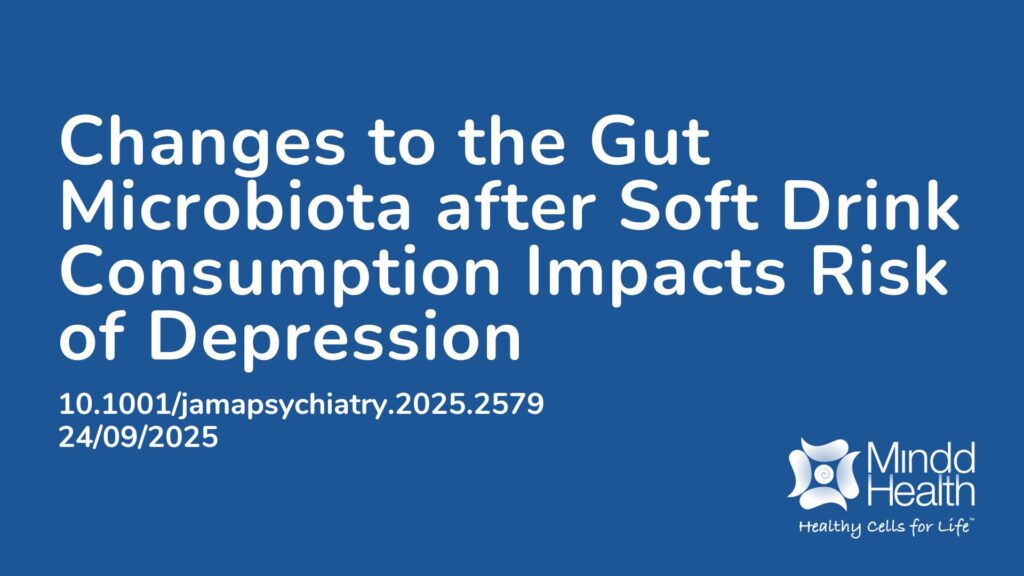Summary:
This study investigated whether soft drink consumption is linked to major depressive disorder (MDD) and whether gut microbiota changes contribute to this relationship. Data was analyzed from 932 adults (405 with MDD and 527 healthy controls) aged 18 to 65 years. Participants were recruited between 2014 and 2018, and analyses were conducted in 2024. Results showed that higher soft drink intake was associated with both MDD diagnosis and greater symptom severity. These effects were more pronounced in women. Among female participants, higher consumption was related to increased abundance of a certain gut bacterium, Eggerthella. Other anaylsis also indicated that Eggerthella partially explained the link between soft drink intake and depression, accounting for roughly 4-5% of the effect. The findings suggest that soft drink consumption may contribute to depression in part through alterations in gut microbiota. Strategies to reduce soft drink intake could help lower depression risk, particularly in women, and targeting the microbiome may represent a promising avenue for intervention.
Abstract:
Importance Soft drink consumption is linked to negative physical and mental health outcomes, but its association with major depressive disorder (MDD) and the underlying mechanisms remains unclear. Objective To examine the association between soft drink consumption and MDD diagnosis and severity and whether this association is mediated by changes in the gut microbiota, particularly Eggerthella and Hungatella abundance. Design, Setting, and Participants This multicenter cohort study was conducted in Germany using cross-sectional data from the Marburg-Münster Affective Cohort. Patients with MDD and healthy controls (aged 18-65 years) recruited from the general population and primary care between September 2014 and September 2018 were analyzed. Data analyses were conducted between May and December 2024. Main Outcomes and Measures Primary analyses included multivariable regression and analysis of variance (ANOVA) models examining the association between soft drink consumption and MDD diagnosis and symptom severity, controlling for site and education, and Eggerthella and Hungatella abundance, controlling for site, education, and library size. Mediation analyses tested whether microbiota abundance mediated the soft drink–MDD link. Results A total of 405 patients with MDD (275 female patients [67.9%]; mean [SD] age, 36.37 [13.33] years) and 527 healthy controls (345 female controls [65.5%]; mean [SD] age, 35.33 [13.13] years) were included. Soft drink consumption predicted MDD diagnosis (odds ratio [OR], 1.081; 95% CI, 1.008-1.159; P = .03) and symptom severity (P < .001; partial η2 [ηp2], 0.012; 95% CI, 0.004-0.035), with stronger effects in women (diagnosis: OR, 1.167; 95% CI, 1.054-1.292; P = .003; severity: P < .001; ηp2, 0.036; 95% CI, 0.011-0.062). In women, consumption was linked to increased Eggerthella (P = .007; ηp2, 0.017; 95% CI, 0.0002-0.068), but not Hungatella abundance. Mediation analyses confirmed that Eggerthella significantly mediated the soft drink–MDD association (diagnosis: P = .011; severity: P = .005), explaining 3.82% and 5.00% of the effect, respectively. Conclusions and Relevance In this cohort study, it was found that soft drink consumption may contribute to MDD through gut microbiota alterations, notably involving Eggerthella. Public health strategies to reduce soft drink intake may help mitigate depression risk, especially among vulnerable populations; in addition, interventions for depression targeting the microbiome composition appear promising.
Article Publication Date: 24/09/2025
DOI: 10.1001/jamapsychiatry.2025.2579



